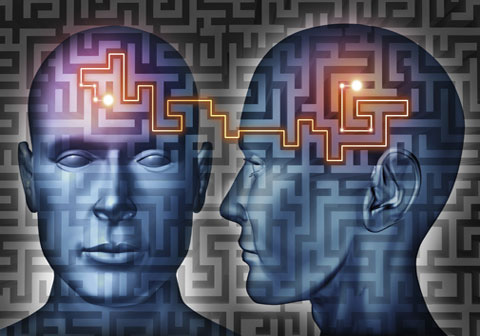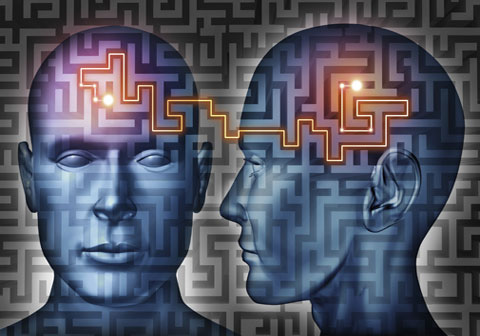
Technology, Transhumanism and the Future of Advertising

Consider that one of the simplest expressions of the new technology would be the ability to make “phone calls” from one head to another without apparent instrumentation.
Homo Sapiens 2.0?
I’ll begin by admitting that what I have to say sounds like science fiction, but it definitely is not. You probably haven’t come across the term “ transhumanism ” as yet – relatively few people have. It refers to a concept being knocked around by futurists and people who study the effects of media on society. It’s based on the burgeoning influence of digital media on our lives, along with advances that are being made in artificial intelligence and nanotechnology. Transhumanists propose that it is only a matter of time before we will be able to become one with the machine (in this case, digital media). They call this “singularity”… and some anticipate that it will occur within the next twenty years.
Now, before you start conjuring up images of Arnold running wild in the Terminator flicks, keep in mind that this is the opposite of the man vs. machine paradigm. Rather than imbuing machines with human qualities, singularity speaks to giving humans digitally enhanced capabilities to support and amplify our native ones. Will this be good? Will it be bad? Depending on the context, probably both.
Is Google really dumbing us down?
Let’s be honest, the process is already under way, and limited only by the primitive nature of our existing interface tools (i.e., eyes, ears, voice and thumbs). We already carry around devices that remember phone numbers and addresses for us, supplement whatever sense of direction we may have with maps and turn-by-turn directions, perform mathematical calculations, and provide us with access to information sources from around the world. Quite naturally, this has raised the question of whether or not increasing reliance on such devices and applications is eroding our natural intelligence.
A recent study at Columbia University demonstrated that subjects were significantly less likely to remember information that they knew they could easily access again using a search engine. Is this proof of diminishing mental capacity? Hardly. Why commit to memory something you can easily access otherwise? Isn’t this why we’ve always used notebooks and maps? Engineers and scientists did not become dumber once they gave up slide rules and graph paper in favor of electronic calculators. Sure, they may no longer be able to regurgitate many of the formulae they memorized as undergraduates, but they don’t have to. Not so long as they understand what the results mean and how to apply them.
Innate vs. acquired capabilities
Using media to amplify our capabilities has been going on ever since our distant ancestors began carving notches on a stick to keep track of numbers. And certain skills may indeed be diminished when a new medium emerges to serve the same function with greater efficiency, much in the way that written histories supplanted the oral traditions of earlier cultures.
Whether or not increasing reliance on digital media and mobile devices compromises our innate capabilities is a question no one can answer. Certain skills and talents appear to be hardwired into us at birth. Some people have a natural sense of direction; their capabilities may well be enhanced by the access to additional information. Those with less geographic skills who have learned to rely on maps and directions are likely to lose those learned skills, but only because they are no longer relevant.
Haves and have nots
What singularity speaks to is bypassing the sensory interface tools we now employ in favor of direct access between the mind and digital media. It’s pointless to grieve over the loss of learned skills once they have limited relevance. Infinitely more important is the potential impact that new and enhanced human capabilities will have on society.
The most apparent of these will be the difference in ability between those with the desire and financial strength to embrace the new technology and those who do not. This divide will very likely be manifest along socioeconomic, religious and generational lines. Will those who refuse or lack the resources to take advantage of neural augmentation be able to coexist, let alone compete, with those who embrace it?
Consider that one of the simplest expressions of the new technology would be the ability to make “phone calls” from one head to another without apparent instrumentation. Are we prepared to address the conflicts certain to arise when some members of society share this digital version of telepathy while others do not? What about the ability to perform complex calculations in seconds, or retrieve information instantaneously? Neural augmentation promises to level the playing field among those who accept it by compensating for individual cognitive deficits. Ironically, it also has the potential of creating an immense rift between those who enjoy its advantages and those who do not – a gulf as wide as that which isolates mainstream American culture from the Amish.
Singularity and the Future of Advertising
As far as my own profession is concerned, it is impossible to predict what effects singularity might have on advertising. At its most basic level, marketers and advertisers concern themselves with instilling a particular message in the heads of people to whom it has relevance. We achieve this through the use of engagement and entertainment, and frequent exposure through a variety of media. How will singularity affect the way marketing agencies use media? Will it alter the ways in which advertisements are integrated with people’s existing information-gathering habits? With enhanced mental capacity and capability, and instantaneous access to global networks, will the concept of entertainment for those so enhanced change radically? Will mass media and digital advertising continue to be relevant for those with neural augmentation? Marketing and advertising will certainly continue to exist, but the forms that they take will be dictated by the larger issues of social and psychological change that result from the singularity.
Technology and Human Evolution …and Natural Selection
For better or worse, this is not science fiction. Most, if not all, of the necessary technologies are already being developed, albeit with disparate intentions and goals. Google’s new Glass, which will be introduced in the coming year at about $1,500, is an example of technology literally in front of our eyes in a form of eyewear. It is an example of the convergence that will occur and which will ultimately confirm the transhumanists’ projections.
Whether it happens in 20 years or 200, the integration of man with media will clearly define the next stage in human evolution and establish the future direction of our socio-political systems. And natural selection can be a bitch.
